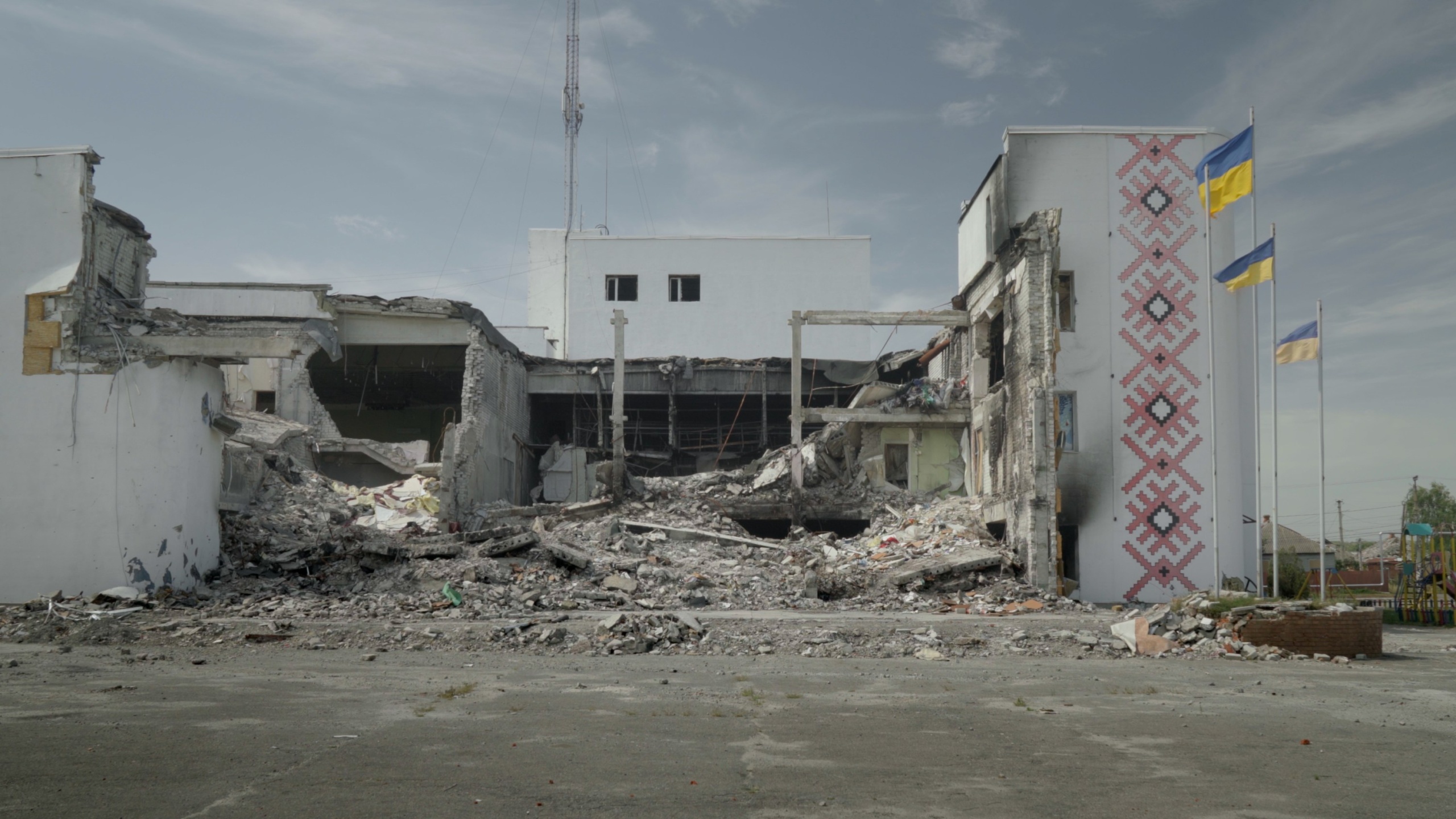
In Oksana Karpovych’s “Intercepted,” images in the rearview may be closer than they appear. The oblique war chronicle takes a retroactive approach to Russia’s full-scale invasion of Ukraine, contrasting phone calls from Russian soldiers on the front lines with haunting, often static images of the war’s aftermath. The result is synesthesic dissonance, where sound forces you to fill the frame with your own images of life and death.
This uneasy marriage of picture and sound is rooted in Karpovych’s own experience as an Al Jazeera producer in Ukraine when the invasion began in March 2022. Her position afforded her access to countless hours of conversation between invading infantrymen and their families back home. These phone calls — between husbands and wives, sons and parents, fathers and children — range from bewildered to barbaric. Some of the men are unsure of where they are, or where they’re going next; they have no choice but to follow orders. Others, meanwhile, are intent on slaughtering “khokhol,” an ethnic slur for Ukrainian men, spoken frequently and freely.
There’s violence inherent to these conversations, but the images with which they’re (mis)matched tend to be serene. Children playing on makeshift swings. Neighbors lining up to share meals. Shots of kids and adults alike staring out of living room windows, lost in contemplation. However, the towns and cities where this footage was shot also bear the bruises of mass conflict. For lengthy stretches, Karpovych places her camera within dilapidated homes, whose walls have been blown apart by artillery. The violence of each images resides in its echo — it lives in the past of these moving pictures, somewhere in the imagination, but its terrifying implications are made all the more real (and complex) by the overlaid recordings.
The topics of discussion, between the soldiers and their loved ones, range wildly from politics to daily rations, but they’re underscored by a casual dehumanization and resentment. The movie’s stylistic tension, between images of life being lived (or having been lived), and disembodied voices portending death, connects the dots between ideology and action, between propaganda and bloodshed. But in removing the outcome from our field of view — the exact moments of decision; of triggers pulled; of soldiers turned to murderers; of civilians turned to corpses; — Karpovych crafts a war film in which the politics and mechanics of war supersede its depiction, and thus, its cinematic fetishization. If Truffaut’s adage of never having seen an “anti-war film” had thus far held true, the notion is now well and truly shattered.
As much as “Intercepted” is a work of chilling stillness, it’s also a film about movement. The film’s crew traverses rural landscapes beneath overcast skies, following the trails of military vehicles left behind in wet mud. However, the frame often embodies the kind of vehicular motion that leaves such scars on the ground in the first place. In an early scene, the camera is mounted on a tank turret; an enormous gun barrel protrudes as if from the audience’s vantage, invading the lush landscape. This image appears just once, but it goes hand in hand with fleeting shots of broken down and abandoned military vehicles lining isolated roads, which repeat like a nervous tic. The specter of the war machine is ever-present. When the camera travels between villages, reflections in the corners of barely-visible windshields rattle and vibrate, as though tank treads were shaking the earth.
The worst of the conflict may be behind Ukraine — a brief text title notes the peak of the invasion lasted until November 2022 — but “Intercepted” imbues it with a sense of present-ness and unpredictability, merely through the notions and opinions expressed within each phone call. Some are ruthless, vicious, and calculating. They conjure the ghosts of war amidst the debris of once unassuming spaces, like elementary school classrooms. Others, meanwhile, are desperate and despondent, from people who recognize the horrors they’ve been forced to commit. But perhaps the most revealing calls are the ones where these opposing perspectives come into conflict on either side of the phone line, yielding tension between people whose faces we never see, and whose resolutions, if any, remain a mystery.
Could these people somehow change each other’s points of view? And if so, would they change them for the better? In a more traditional, more linear film, these questions would be foundational to the central drama. But in “Intercepted,” where they exist as echoes of the past contrasted with images of wanton destruction in the present, they’re reduced to realizations and regrets that have come far too late, and whose worth is insignificant.
Just as bleak as any recorded admission of atrocity is the film’s complete and utter lack of redemptive instinct. It isn’t interested in finding a bright side to war; such an outcome would feel too complacent. Instead, it points its microphone unflinchingly at the darkest parts of the human soul, while forcing the viewer to hold the camera and search for the brutality within its images and empty spaces. It makes the audience, and their recognition, a necessary ingredient to portraying the bigger picture.
Grade: A
“Intercepted” premiered at New Directors/New Films. It is currently seeking U.S. distribution.





